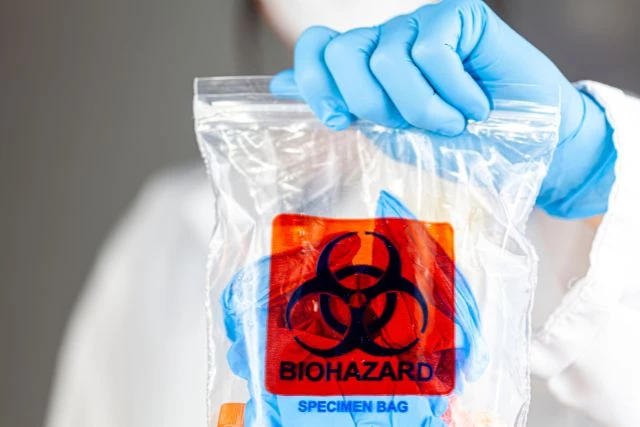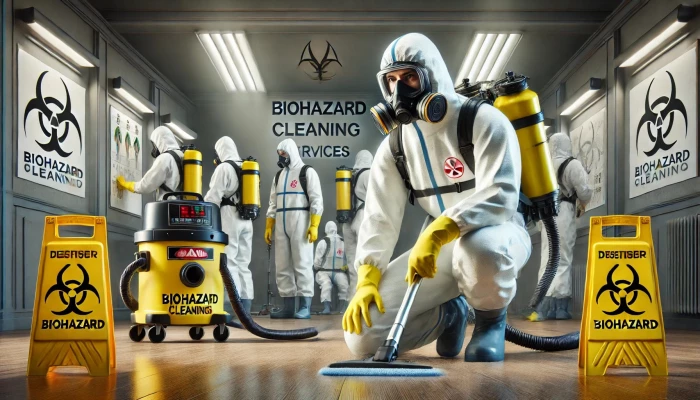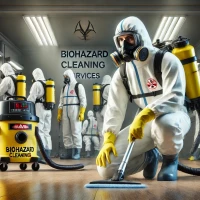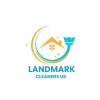Deep Cleaning Services By Landmark Cleaners: Your Complete Guide

Biohazard Cleaning
Get in touchBiohazard cleaning is a crucial service that involves the safe and thorough cleaning, disinfection, and disposal of biohazardous materials.
We will explore the importance of biohazard cleaning, the risks associated with improper handling of biohazards, and the specific steps involved in a biohazard cleaning process.
Take a closer look at Landmark Cleaners, a company renowned for its expertise in biohazard cleaning and other exceptional services we provide.
Learn more about this essential service.
What is Biohazard Cleaning?
Biohazard cleaning involves specialised cleaning services that focus on decontaminating areas contaminated with biological substances or hazardous waste. This includes COVID-19 cleaning to ensure safe and thorough disinfection.
Due to the serious health risks associated with exposure to biohazards, it is crucial to rely on professionals who are equipped with the knowledge, tools, and protective gear necessary for the safe removal of hazardous waste. These experts follow strict protocols to effectively clean and decontaminate the affected areas, ensuring that no dangerous materials are left behind.
Biohazard cleaning goes beyond just surface cleaning; it involves thorough decontamination of all affected surfaces, including hard-to-reach areas that may harbour dangerous pathogens. This level of meticulous cleaning is crucial in preventing the spread of infections and maintaining a safe environment for occupants.
Why is Biohazard Cleaning Important?
Biohazard cleaning is crucial due to the risks associated with exposure to hazardous materials and biological substances. Proper decontamination and the removal of hazardous waste are essential to protect public health and ensure safe practices.
Advancements in decontamination technologies have revolutionised the field, allowing for more efficient and thorough cleaning processes. Utilising cutting-edge equipment and techniques, biohazard cleaning professionals can effectively remove harmful pathogens and contaminants from various surfaces.
Public liability plays a crucial role in maintaining high standards of safety during biohazardous waste cleaning operations. Ensuring that professionals are adequately trained and certified, as well as obtaining the necessary insurance coverage, is key to upholding safe practices and protecting both workers and the public.
What are the Risks of Not Properly Cleaning Biohazards?
Neglecting proper cleaning of biohazards poses severe risks, including the spread of biological substances, hazardous waste contamination, and potential transmission of viruses and diseases.
Biological substances left unattended can pose a serious threat to human health if not dealt with properly. Exposure to pathogens, including bacteria, viruses, and fungi, can lead to infections and illnesses. Hazardous waste contamination resulting from inadequate biohazard cleaning can have long-lasting environmental repercussions, affecting ecosystems and water sources.
The transmission of viruses and diseases is a significant concern when biohazards are not efficiently sanitised. Pathogens can easily spread through contact, droplets, or airborne particles, putting individuals at risk of contracting severe illnesses. Proper biohazard cleaning is crucial to prevent these dangers from escalating and safeguard public health.
What Does Biohazard Cleaning in [LOCATION] Entail?
Biohazard cleaning encompasses deep cleaning processes that ensure complete decontamination of the affected area. This may involve specialised services, such as odour deodorising, to address lingering smells.
In terms of biohazard cleaning, the procedures are meticulous and thorough. First and foremost, the area must be appropriately assessed to determine the extent of the contamination. Once this is established, the cleaning process begins with the removal of any visible biohazardous materials. This is followed by a deep cleaning of all surfaces using specialised cleaning agents and equipment designed to eradicate any traces of hazardous substances.
Complete decontamination is achieved through a combination of scrubbing, sanitising, and disinfecting every inch of the affected area. This level of detail is essential to ensure that no harmful pathogens or contaminants remain. The use of odour deodorising services is crucial not only to eliminate foul smells but also to neutralise any lingering harmful particles in the air.
What Equipment and Materials are used in Biohazard Cleaning in ?
Biohazard cleaning utilises specialised equipment and materials such as sharp waste removal tools, disinfecting solutions, and advanced decontamination technologies to ensure thorough cleaning.
Sharp waste removal devices are crucial in handling biohazardous waste, ensuring safe disposal without risk of contamination. Disinfectants play a vital role in killing harmful pathogens and bacteria present in the affected area. Innovative decontamination technologies, such as ozone treatments and UV light sterilisation, are gaining popularity for their effectiveness in eliminating biohazards.
What Safety Precautions are Taken During Biohazard Cleaning?
Safety precautions during biohazard cleaning include the use of protective gear to handle hazardous substances, adherence to health and safety standards, and insurance coverage, such as employers' liability insurance, to protect workers.
Proper handling and disposal of biohazard substances are crucial to prevent exposure and contamination. Maintaining strict compliance with health and safety regulations ensures a safe working environment for all involved. This includes thorough decontamination procedures to eliminate any risks of cross-contamination or spread of harmful pathogens.
Insurance coverage, such as employers' liability insurance, is essential for providing financial protection to workers in the event of accidents or injuries during biohazard cleaning tasks. This ensures that employees are adequately compensated and have access to necessary medical care if such unfortunate events occur.
Why Choose Landmark Cleaners for Biohazard Cleaning?
We stand out as a top choice for biohazard cleaning due to our expertise in biohazard clean-up, trauma cleaning services, and rapid emergency response capabilities.
In terms of dealing with potentially hazardous situations, it's crucial to trust experienced professionals like us. Our specialisation in trauma cleaning means they have the skills and knowledge to handle even the most challenging clean-up tasks with precision and care.
In times of crisis, having a reliable partner like Landmark Cleaners can make all the difference, ensuring thorough, efficient, and safe clean-up operations.

What Sets Landmark Cleaners Apart from Other Biohazard Cleaning Companies?
Each team member at Landmark Cleaners undergoes extensive training to handle various biohazard situations effectively. They are equipped with state-of-the-art tools and techniques to ensure thorough and safe cleaning processes. We offer a wide range of biohazard cleaning services, including crime scene cleanup, trauma scene decontamination, and infectious disease cleanup.
What truly sets Landmark Cleaners apart is our unwavering commitment to maintaining the highest standards of cleanliness and safety. By adhering to strict protocols and utilising the latest advancements in cleaning technologies, we guarantee a pristine and hazard-free environment for our clients.
What Types of Biohazards Can Landmark Cleaners Handle?
Landmark Cleaners can handle various biohazards, including crime scene clean-up, unattended death cleaning, and sharp waste removal with precision and efficiency.
Crime scene clean-up involves the careful removal of blood, bodily fluids, and other potentially infectious materials following a traumatic event. Our trained professionals understand the sensitivity of these situations and approach them with compassion and discretion.
Unattended death cleaning requires specialised expertise to decontaminate and sanitise the affected area properly. Landmark Cleaners utilise industry-standard protocols and advanced cleaning techniques to restore the environment safely.
Additionally, Landmark Cleaners has the necessary equipment and knowledge to handle sharp waste properly, reducing the risk of injuries and preventing the spread of infections.
How Do Landmark Cleaners Dispose of Biohazardous Waste?
Landmark Cleaners adheres to strict protocols for the disposal of biohazardous waste, ensuring proper handling to protect against cross-contamination, with support from their dedicated environmental cleaning team.
After collecting biohazardous waste, we properly segregate it according to its type and level of risk. The environmental cleaning team meticulously labels each container to guarantee safe disposal. They utilise specialised equipment and follow industry standards to minimise any potential risks during transportation and disposal.
Additionally, the team undergoes regular training and is equipped with personal protective gear to prevent exposure to hazardous substances. Our commitment to adhering to stringent waste disposal procedures not only ensures a safe working environment for our employees but also contributes to overall public health and environmental protection.
What Are the Steps Involved in a Biohazard Cleaning Job?
Biohazard cleaning jobs by Landmark Cleaners follow a systematic process including assessment and planning, thorough cleaning, disinfection, and a final inspection with certification to ensure quality assurance.
Once the assessment phase is completed, the team at Landmark Cleaners meticulously proceeds with the cleaning process. They employ specialised tools and techniques to safely remove all traces of biohazards, ensuring a clean and sanitised environment.
Following thorough cleaning, a comprehensive disinfection procedure is performed. This step involves applying high-grade disinfectants to eliminate any remaining pathogens and prevent the risk of contamination.
Upon completion of the cleaning and disinfection stages, a final inspection is conducted to assess the effectiveness of the decontamination process. Only after meeting the stringent standards set by Landmark Cleaners is a certification of completion issued, providing clients with the confidence that their property is safe and free from biohazards.
Assessment and Planning
The initial phase of a biohazard cleaning job involves a detailed assessment and planning process by Landmark Cleaners to determine the scope of the task, plan services, and ensure rapid removal of hazards.
During this critical stage, the team at Landmark Cleaners meticulously inspects the affected area, identifying all potential biohazards present, such as blood, bodily fluids, or hazardous chemicals. This thorough evaluation allows them to create a strategic plan tailored to the specific needs of the site, including the use of specialised equipment and cleaning agents.
Efficient coordination with the client is also a key focus during this phase, ensuring that all necessary permissions are obtained and any specific requirements are addressed promptly. By establishing a clear roadmap from the outset, Landmark Cleaners can swiftly and effectively initiate the clean-up process, minimising any further risks or potential contamination.
Containment and Removal of Biohazardous Materials
The containment and removal phase in biohazard cleaning tasks by us focuses on safely securing hazardous materials, containing the spread, and executing proper disposal methods.
One of the crucial safety measures involves using specialised personal protective equipment (PPE) such as gloves, masks, and suits. These are worn to prevent direct contact with biohazardous materials and ensure the safety of the cleaning team. Biohazardous materials are placed in leak-proof containers to prevent any spillage or contamination of the surrounding area. Following containment, the next step is carefully transporting these materials to designated disposal sites approved for handling hazardous waste.
Thorough Cleaning and Disinfection
Landmark Cleaners pays close attention to each step of its meticulous cleaning and disinfection procedures. Their deep cleaning methods go beyond surface cleaning to reach the hidden corners and tough-to-reach spots, ensuring a comprehensive sanitisation process. Their disinfection services are carried out using industry-standard products and techniques, which effectively target germs and bacteria.
An essential aspect of their cleaning regimen is the use of odour deodorising techniques, which not only eliminate unpleasant smells but also enhance the overall sanitation of the space. This attention to detail sets Landmark Cleaners apart in providing a truly hygienic environment for their clients.
Proper Disposal of Waste
The waste disposal phase managed by Landmark Cleaners involves the proper handling and disposal of hazardous waste in compliance with environmental regulations to ensure safety and prevent contamination.
Landmark Cleaners prioritises environmental regulations to ensure that all waste, especially hazardous materials, is managed responsibly.
They follow stringent guidelines for segregating different types of waste so that hazardous materials are properly identified and disposed of using the appropriate methods.
Additionally, in adherence to regulations, Landmark Cleaners implements safety protocols to protect both its employees and the environment from potential harm during the waste disposal process.
Final Inspection and Certification
The final stage includes a meticulous inspection by Landmark Cleaners to ensure complete decontamination, adherence to the highest standards, and certification by their expert team for quality assurance.
During this crucial phase, Landmark Cleaners meticulously examines every aspect of the cleaning process, from the removal of dirt and stains to the sanitisation of fabrics or surfaces.
Their team ensures that all protocols have been followed diligently, with no compromise on quality or effectiveness.
Once satisfied with the thoroughness of the cleaning job, Landmark Cleaners issues a meticulously crafted certification for the client's peace of mind, assuring complete decontamination and adherence to industry-leading standards.
Frequently Asked Questions
What is biohazard cleaning, and why is it important?
Biohazard cleaning refers to the process of safely and thoroughly removing potentially hazardous biological materials from a contaminated area. This includes blood, bodily fluids, and other infectious substances. It is important because these materials can carry harmful pathogens and pose a serious health risk if not correctly cleaned and disposed of.
What does biohazard cleaning entail?
Biohazard cleaning involves the use of specialised equipment and cleaning agents to remove, disinfect, and dispose of hazardous materials safely. This can include proper containment and disposal of biohazardous waste, thorough cleaning of affected surfaces, and decontamination of the area to prevent the spread of harmful pathogens.
Why should I hire a professional biohazard cleaning company?
It is highly recommended to hire a professional biohazard cleaning company for several reasons. Firstly, they have the necessary training and expertise to handle hazardous materials safely and effectively. They also have access to specialised equipment and cleaning agents that are not readily available to the general public. Additionally, hiring professionals can save you time and ensure that the area is thoroughly cleaned and decontaminated.
Will my insurance cover the cost of biohazardous waste cleanup?
In many cases, yes, your insurance will cover the cost of biohazard cleaning. However, it is essential to check with your insurance provider beforehand to determine the extent of coverage. Our team at Landmark Cleaners can also assist you with the insurance claim process to make it as smooth as possible.
Is biohazard cleaning only necessary for crime scenes?
No, biohazard cleaning may be necessary for various situations, including unattended deaths, industrial accidents, and hoarding cleanups. A professional biohazard cleaning company should handle any situation that involves potentially hazardous materials to ensure the safety and well-being of all individuals involved.
Summary
If you need help with biohazard cleaning, contact us today - we can assist you wherever you are and respond promptly.
Get in touch
Skip to
Gallery

